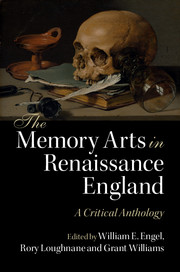Book contents
- Frontmatter
- Dedication
- Contents
- List of figures
- Acknowledgements
- A note on abbreviations
- Introduction
- PART I The art of memory
- PART II Rhetoric and poetics
- PART III Education and science
- PART IV History and philosophy
- Introduction to Part IV
- IV.1 Lodowick Lloyd, The Pilgrimage of Princes (1573)
- IV.2 William Camden, Remains Concerning Britain (1605)
- IV.3 Francis Bacon, The Advancement of Learning (1605)
- IV.4 Pierre Charron, Of Wisdom (1608)
- IV.5 John Weever, Ancient Funeral Monuments (1631)
- IV.6 Edward Reynolds, A Treatise of the Passions and Faculties (1640)
- IV.7 Thomas Fuller, selected works
- IV.8 Kenelm Digby, Two Treatises (1644)
- IV.9 Thomas Hobbes, Leviathan (1651)
- IV.10 William Dugdale, Baronage of England (1675–1676)
- PART V Religion and devotion
- PART VI Literature
- Index
- References
IV.10 - William Dugdale, Baronage of England (1675–1676)
from PART IV - History and philosophy
Published online by Cambridge University Press: 05 August 2016
- Frontmatter
- Dedication
- Contents
- List of figures
- Acknowledgements
- A note on abbreviations
- Introduction
- PART I The art of memory
- PART II Rhetoric and poetics
- PART III Education and science
- PART IV History and philosophy
- Introduction to Part IV
- IV.1 Lodowick Lloyd, The Pilgrimage of Princes (1573)
- IV.2 William Camden, Remains Concerning Britain (1605)
- IV.3 Francis Bacon, The Advancement of Learning (1605)
- IV.4 Pierre Charron, Of Wisdom (1608)
- IV.5 John Weever, Ancient Funeral Monuments (1631)
- IV.6 Edward Reynolds, A Treatise of the Passions and Faculties (1640)
- IV.7 Thomas Fuller, selected works
- IV.8 Kenelm Digby, Two Treatises (1644)
- IV.9 Thomas Hobbes, Leviathan (1651)
- IV.10 William Dugdale, Baronage of England (1675–1676)
- PART V Religion and devotion
- PART VI Literature
- Index
- References
Summary
About the author
William Dugdale (1605–86) took seriously his appointment as ‘Norroy king of arms’ and ‘visited’ all counties north of the Trent. After the publication of Baronage of England, Dugdale was knighted in 1677 in connection with becoming ‘Garter king of arms’, receiving £100 per annum plus residence at Windsor.
About the text
Three decades of research went into his Baronage, a decisive account of England's aristocracy beginning with the Saxons. So painstakingly responsible was his medieval scholarship that heralds and historians still refer to it. The preface declares Dugdale's goal: to wrest from oblivion the familial lines of noble descent by recovering the legal grounds for their original elevation.
The arts of memory
Heraldry is a national art of memory that uses a visual lexicon corresponding to established rules for granting and depicting coats of arms, a system which Dugdale sought to revive, reform and stabilise. The authority of the College of Arms had not been recognised or exercised during the Interregnum. The herald's role thus became more than simply that of a ‘remembrancer’ recording the names of nobles who had fallen in combat (Dugdale was in fact the ‘surveyor’ following the battle at Edgehill), but also a preserver of the worthy deeds and sayings of members of illustrious families.
Textual notes
William Dugdale, The Baronage of England (London, 1675–6), B1r–C2r.
The Baronage of England
There having been so much, and so well, in general, already spoken in few words, by the great orator Cicero, in commendation of history, that it is the witness of times past, the voice of antiquity, the light of truth and the life of memory; to offer more, were superfluous. Most certain we are, that everyone, naturally, is desirous of knowledge; and experience teacheth us that the gaining thereof is not any way better than by observing the success which hath attended the actions of other men.
- Type
- Chapter
- Information
- The Memory Arts in Renaissance EnglandA Critical Anthology, pp. 221 - 224Publisher: Cambridge University PressPrint publication year: 2016



